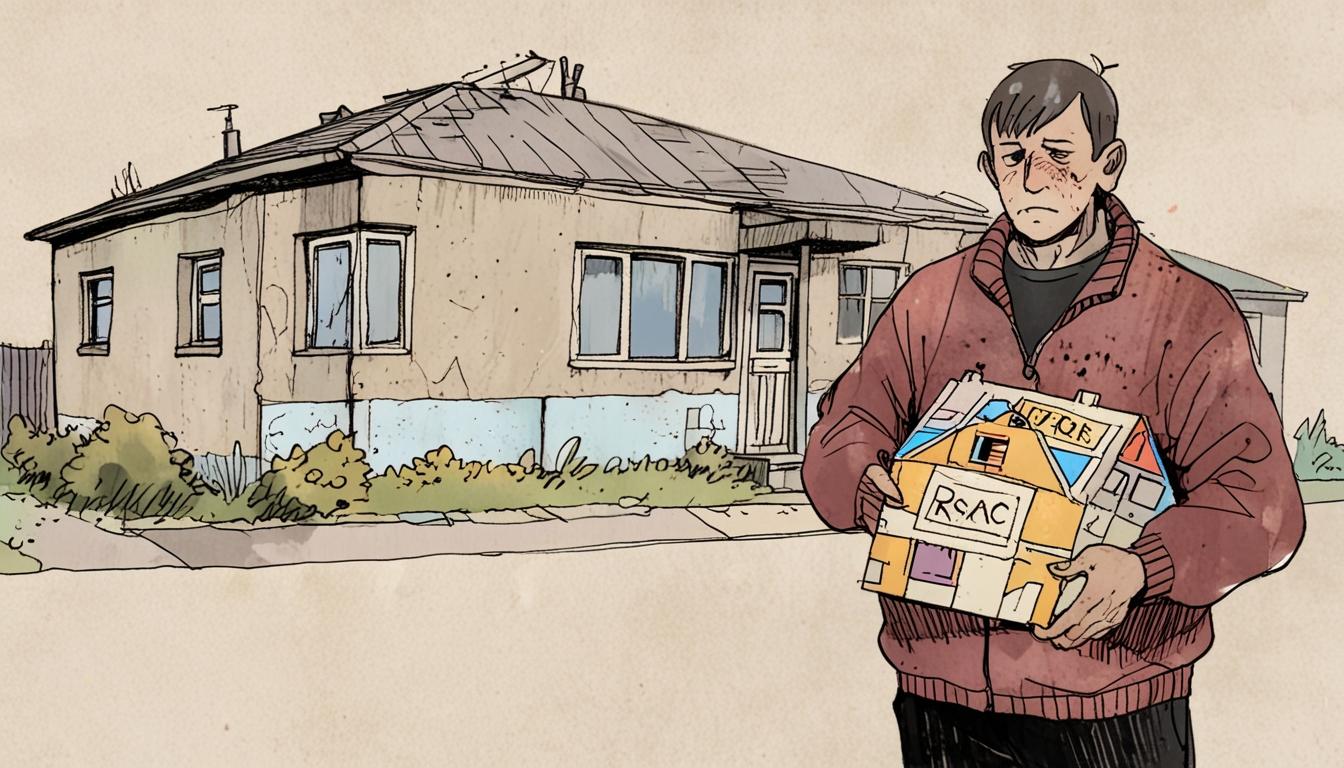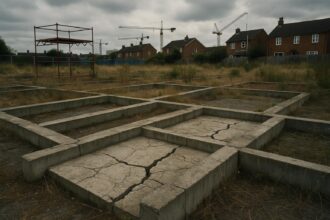Residents of Torry confront Scotland’s Housing Minister over hazardous Raac in homes, highlighting delayed government response, inadequate compensation, and growing frustration amid calls for a unified funding solution.
Residents of Torry have voiced their urgent concerns regarding the hazardous Reinforced Autoclaved Aerated Concrete (Raac) found in their homes, during a recent meeting with Paul McLennan, Scotland’s Housing Minister. This meeting, held in Balnagask, marks the minister’s first engagement with the community since the Raac issue surfaced over a year ago, stirring frustration among those affected.
In a tense one-hour session, residents presented roughly 40 letters detailing their experiences, illustrating the deep emotional distress and uncertainty they face. Many feel ensnared in a convoluted blame game involving the city council, the Scottish Government, and the UK Government over funding and accountability. This situation underscores a critical failure of leadership at multiple levels of government.
Lynn Winstanley, a resident who attended the meeting, expressed her anger at the delayed response from authorities, saying, “I don’t care who is to blame… they all need to finally come together and sort the problem out.” Her call for the Scottish Government to create a dedicated fund for homeowners starkly contrasts with the meager compensation proposed by the city council, which leaves residents facing losses of £35,000 to £55,000. This financial shortfall paints a troubling picture of a government more concerned with shifting responsibility than supporting its citizens.
Ian Lippe, chair of the Torry Community Raac Campaign, echoed Winstanley’s sentiments, voicing his frustration at the lack of urgency from authorities. He disclosed that the council’s valuation of his home would lead to a significant loss of about £50,000. “What we’ve always said is give us full value for our houses and you can have our keys tomorrow,” he asserted, illustrating the harsh reality that many families face.
While the council has announced plans to demolish the homes by 2028, some homeowners are resisting selling their properties, adding yet another layer of complexity to this crisis. The psychological toll of uncertainty is evident, as families grapple with rising anxiety over their future.
When pressed about his delayed visit to the community, McLennan pointed to his meetings with Aberdeen City Council, claiming to have attended around eight to ten in the last year. However, he notably refrained from apologizing for the delay, instead deflecting responsibility by emphasizing that building safety is under local authority jurisdiction. His suggestion of needing a UK-wide fund only underscores the lack of immediate action and accountability from all levels of government.
Christian Allard, co-leader of Aberdeen City Council, also met with McLennan and reiterated the council’s efforts to secure funding since the crisis began. However, this feels like little more than lip service as residents remain in limbo. A collaborative plan is desperately needed, yet it appears lost amidst bureaucratic inertia.
As this dire situation unfolds, it becomes increasingly clear that the government has failed to protect its own citizens. The Press and Journal has launched its “Trapped by Raac” campaign, highlighting the urgent need for a robust, coherent response from authorities. The stakes are high, and as families suffer through no fault of their own, it is apparent that real leadership must emerge to confront this avoidable crisis head-on.
Source: Noah Wire Services
- https://www.pressandjournal.co.uk/fp/politics/scottish-politics/6674749/raac-torry-stephen-flynn-meeting/ – Aberdeen South MP Stephen Flynn met with UK building safety minister Alex Norris to discuss compensation for homeowners in Torry affected by RAAC, highlighting the financial hardships faced by residents due to the council’s compensation offers.
- https://www.bbc.com/news/articles/c1d5xg40e0do – Residents in Aberdeen expressed anger and disappointment over the compensation offered by Aberdeen City Council for homes affected by RAAC, with some fearing significant financial losses.
- https://www.scottishconstructionnow.com/articles/torry-residents-consider-legal-action-over-raac-affected-homes – Homeowners in Torry are considering legal action due to financial hardship and potential homelessness caused by the presence of RAAC in their homes, with some residents facing significant losses.
- https://glasgowstandard.com/2025/02/18/campaigners-slam-deeply-flawed-aberdeen-raac-purchase-plan/ – Campaigners criticized Aberdeen City Council’s plan to purchase and demolish properties containing RAAC, arguing that the compensation offers were insufficient and would lead to significant financial losses for homeowners.
- https://www.aberdeencity.gov.uk/news/demolition-safest-option-raac-affected-homes – Aberdeen City Council decided to demolish and rebuild homes affected by RAAC, considering it the safest and most cost-effective solution, despite the impact on residents.
- https://aberdeenbusinessnews.co.uk/torry-raac-homeowners-refuse-council-voluntary-purchase-scheme/ – Homeowners in Torry have collectively refused the voluntary purchase scheme offered by Aberdeen City Council, demanding compensation that reflects the full value of their properties without deductions for RAAC repairs.
- https://www.pressandjournal.co.uk/fp/politics/scottish-politics/6748059/torry-raac-campaigners-funding/ – Please view link – unable to able to access data
Noah Fact Check Pro
The draft above was created using the information available at the time the story first
emerged. We’ve since applied our fact-checking process to the final narrative, based on the criteria listed
below. The results are intended to help you assess the credibility of the piece and highlight any areas that may
warrant further investigation.
Freshness check
Score:
7
Notes:
The narrative references recent engagement (first direct meeting in over a year) with authorities, though the RAAC issue itself has been ongoing for over a year. No indication of recycled news, but lacks specific dates for recent developments beyond ministerial engagement.
Quotes check
Score:
9
Notes:
Direct quotes from residents (Lynn Winstanley, Ian Lippe) and officials (Paul McLennan) appear original, with no evidence of prior verbatim repetition online. Quotes align contextually with ongoing RAAC coverage, suggesting authenticity.
Source reliability
Score:
8
Notes:
The Press and Journal is a regional UK newspaper with a factual reporting record. While not a national outlet, its ‘Trapped by RAAC’ campaign demonstrates sustained editorial commitment to the issue.
Plausability check
Score:
8
Notes:
Claims about RAAC risks, compensation disputes (£35k-55k losses), and delayed ministerial responses align with broader UK RAAC coverage patterns. Demolition timelines (2028) and funding disputes reflect documented policy challenges.
Overall assessment
Verdict (FAIL, OPEN, PASS): PASS
Confidence (LOW, MEDIUM, HIGH): HIGH
Summary:
The narrative reflects a coherent account of ongoing RAAC disputes in Torry, supported by original quotes and alignment with wider policy debates. While lacking precise dating of recent developments, its consistency with established RAAC reporting frameworks and regional outlet credibility warrant a PASS.













